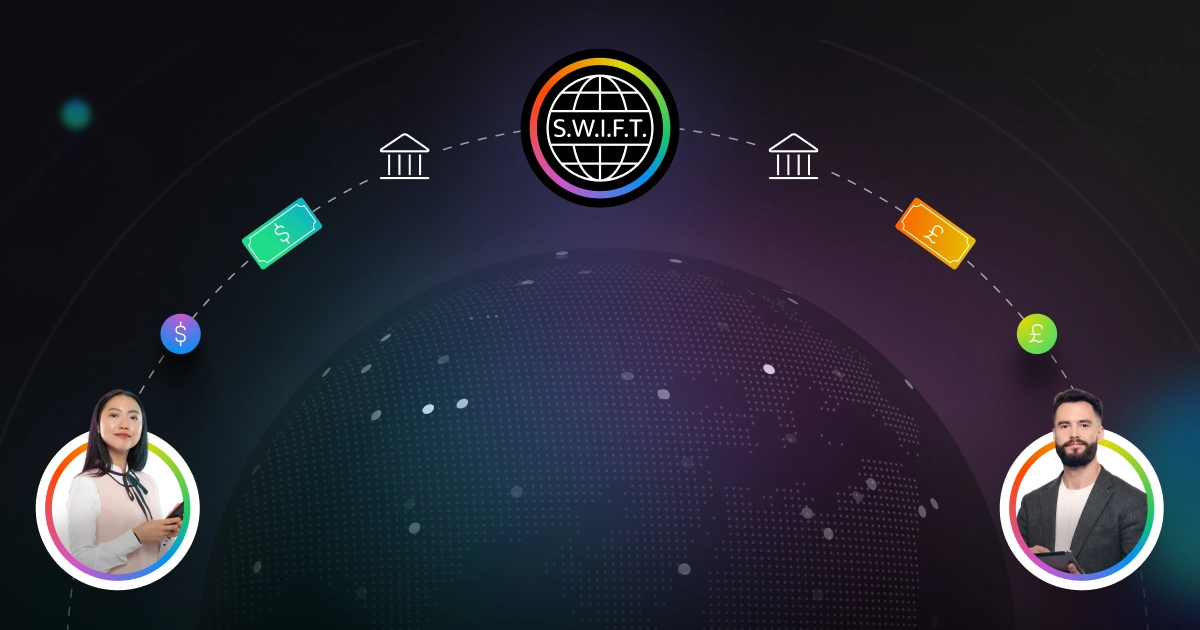SWIFT payments: A comprehensive guide
The rise of global commerce has brought with it the need to make sure money can flow from one country to the next, safely and securely. To ensure smooth transactions, intermediaries or networks are often involved. In Europe, the SWIFT system serves this essential function.

What is SWIFT?
The rise of global commerce has brought with it the need to make sure money can flow from one country to the next, safely and securely. To ensure smooth transactions, intermediaries or networks are often involved. In Europe, the SWIFT system serves this essential function.
SWIFT payments involve sending and receiving international electronic payments through intermediary banks. While the SWIFT network itself doesn’t transfer funds, it facilitates payment orders between banks using SWIFT codes. This system ensures overseas money transfers are quick, accurate, and secure.
Essentially, SWIFT was designed to give a way for different banks to communicate faster and more securely with each other.
Key features of SWIFT
- Network availability: SWIFT boasts a network availability of around 99.999%, ensuring reliable and continuous service.
- ISO 20022 standard: Utilizes the ISO 20022 standard for payments, ensuring a smooth and efficient funds transfer process.
- Transaction fees: SWIFT charges a small fee for each message sent, varying based on message type and destination country. For instance, a transfer from the United States to Europe generally incurs lower fees than one to Asia. Banks may also add their own fees, so it’s crucial to check with your bank for specific costs.
How SWIFT facilitates international money transfers
SWIFT allows banks to communicate in a standardized format, ensuring quick and accurate processing of transfers. This is especially beneficial for large sums of money or businesses making regular payments. However, users should be aware of potentially high fees associated with SWIFT transfers.
Required information for SWIFT transfers
To initiate a SWIFT transfer, you’ll need:
- The recipient’s bank account number and SWIFT code
- The recipient’s name and address
- The currency and amount being transferred
- The reason for the transfer
- Any additional required information (e.g., reference or invoice numbers)
- Bank charges for the transaction
- Sender’s and recipient’s personal identification
- Sender’s and recipient’s authorization for the transaction
- Intermediary bank information, if applicable
Criticisms of SWIFT and alternatives
SWIFT faces criticism for being slower compared to newer options like cryptocurrencies and digital payment services. Transactions can take several days, and faster options come at an additional cost. This inefficiency and lack of transparency can be problematic as more institutions and individuals seek faster, more efficient transfer methods.
Understanding SWIFT money transfer fees
Several fees may apply to SWIFT transfers, including:
- Outgoing wire transfer fee: Charged by the sender’s bank, varying by amount and destination.
- Incoming payment fee: Charged by the recipient’s bank for processing the transfer.
- SWIFT tracing fee: For checking the progress of a payment, especially if delayed or missing.
- Foreign exchange fee: Applies when converting funds into another currency.
Fees can vary significantly between banks, so it’s important to ask for a fee breakdown before confirming your transfer.
Who pays SWIFT fees?
SWIFT fees are usually passed on to customers by banks. The sender can choose who pays the fees using codes:
- OUR: Sender pays all fees.
- SHA: Fees are shared between sender and receiver.
- BEN: Receiver pays all fees.
Check with your bank for their specific policies and fee structures.
SWIFT vs. Payoneer
While SWIFT can be slow and expensive, Payoneer offers a more efficient and cost-effective solution for global money transfers. Payoneer’s services include global bank transfers, mass payouts, and everything your business needs to pay, get paid, and grow globally. With Payoneer, you can avoid SWIFT fees and enjoy faster transaction times, more payment options, and enhanced security features.
Our goal at Payoneer is to help you keep more of what your business earns. That’s why we work hard to keep our pricing low and, whenever possible, completely free.
SWIFT payment costs
Costs associated with SWIFT payments include fees charged by the sender’s and recipient’s banks, foreign exchange fees, and tracing fees. These costs depend on factors such as originating and receiving country banks, number of intermediaries, and forex fees. Always check with your bank for the most current information and a detailed fee breakdown.
Forex fees in SWIFT payments
SWIFT payments typically incur a foreign exchange fee when currencies differ. This fee can range from a few cents to several percentage points of the total transfer amount. Banks often charge higher forex fees due to their market position and lack of transparency in exchange rates.
Avoiding late payments with SWIFT
SWIFT payments can take up to four working days, with potential delays due to public holidays. Plan ahead to avoid late payment fines. With Payoneer, you can bypass these issues, enjoying faster, more reliable global transactions.
Conclusion
For reliable and cost-effective international money transfers, consider alternatives like Payoneer over traditional SWIFT payments. Payoneer’s platform eliminates SWIFT fees, offering a streamlined solution for global transactions. Save money and time by choosing a more efficient transfer method for your business needs.
Learn how Payoneer can help you streamline your international money transfers and save on fees.